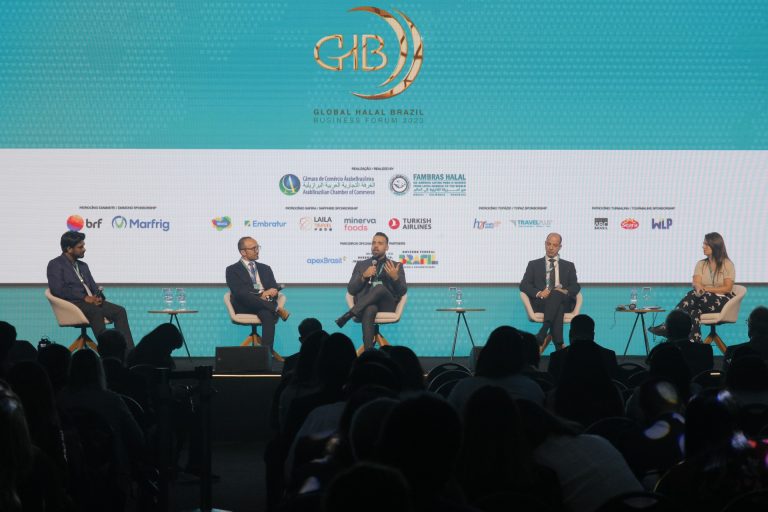São Paulo – Brazil stands out as a leading exporter of halal animal protein, but according to the coordinator of international agribusiness promotion projects at the Brazilian Trade and Investment Promotion Agency (ApexBrasil), Paula Soares, there is a project for other productive sectors to stand out in this market, too.
“The halal market has to go beyond the protein sector. The first step of ApexBrasil’s Halal do Brasil Project, established a year ago, is to make other sectors, such as tourism and fashion, understand halal goes beyond certification. Halal also involves sustainability and supply chain, for example. Brazilian companies outside the protein sector do not have this information yet,” said Soares in the 2nd Global Halal Brazil Business Forum (GHB), held by the Arab-Brazilian Chamber of Commerce (ABCC) and certifier FAMBRAS Halal, this Monday (23), in São Paulo. The ABCC is a partner of ApexBrasil in the Halal do Brasil Project.
In the panel “Added Value of Halal Products for Consumers,” moderated by assistant professor of Sociology and Islamic Studies of Johns Hopkins University in the United States, Ryan M. Calder, Soares spoke about the other initiatives. “The goal of the second and third phases is to bring Brazilian companies to shows and missions held by the government and the ABCC so they can learn more about the halal market and existing sales opportunities in other countries. In addition to Muslim countries, Europe and the United States also consume halal goods. The project is expected to last three years,” added Soares.

In addition to the coordinator of International Agribusiness Promotion Projects of ApexBrasil, other representatives spoke on the topic. “We want to show there are many opportunities in manufactured and processed goods, such as cosmetics and exotic foods, in the Gulf market,” said Khaled El Atat, CCO of Kuwait-based Drops Holding Group.
According to Atat, Brazil has tremendous growth opportunities in these areas in Kuwait because it is already known for its quality products. “To beat the competition with other markets, it is necessary to focus on pricing and product presentation to satisfy the end consumer, who is very demanding.”
The growth prospect for other sectors of the halal market was confirmed by a survey released last year by Salaam Gateway –Global Islamic Economy Gateway. “There is a projection of increased spending in the food and beverage, pharmaceutical, and cosmetics sectors, reaching USD 2 trillion in 2024,” explained Shaik Zakeer Hussain, operations manager of Salaam Gateway in India.
Halal brand reputation
On the panel, the CEO of the Islamic Chamber of Commerce, Industry, and Agriculture (ICCIA), Ashraf El-Tanbouly, drew attention to maintaining the reputation of the Halal brand in the global market.
“We know that Muslims, around 25% of the global population, consume halal products, so there is a massive demand. However, not all countries follow the same standards for halal certification. There are many different certificates, and not all certifications are authentic, which is why there is confusion in the market today. To give more credibility and maintain consumers’ trust, it is necessary to include important data, such as the company’s website. If consumers lose faith in companies, it will be difficult to regain it later,” said El-Tanbouly.
The GHB is supported by the International Halal Academy, the Islamic Chamber of Commerce, Industry and Agriculture, the Union of Arab Chambers, and the Arab League, and held in partnership with the Brazilian Federal Government, Ministry of Development, Industry, Trade and Services, Ministry of Foreign Affairs, and ApexBrasil. Its sponsors are BRF, Marfrig, Minerva Foods, Laila Travel, Turkish Airlines, Brazilian Tourism Board (Embratur), Travel Plus, H2R Insights & Trends, World Logistic Passport (WLP), Bank ABC in Brazil, Seara, Pão & Arte, Cristal Plus, Pamunã Alimentos.
Translated by Elúsio Brasileiro




